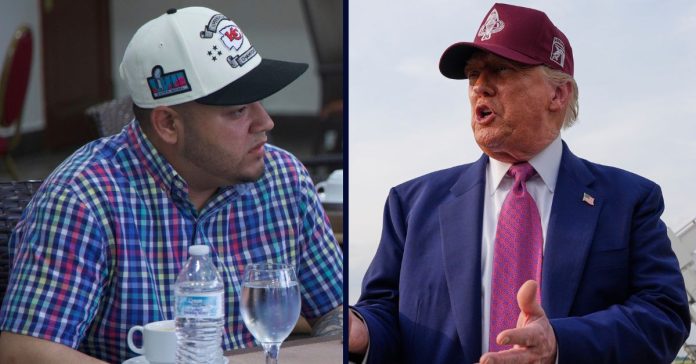
Left: Kilmar Abrego Garcia, a Salvadoran citizen who was living in Maryland and deported to El Salvador by the Trump administration, speaks in a hotel restaurant in San Salvador, El Salvador, Thursday, April 17, 2025. (Press Office Senator Van Hollen, via AP). Right: President Donald Trump speaks to reporters after arriving on Air Force One, Tuesday, June 10, 2025, at Joint Base Andrews, Md. (AP Photo/Alex Brandon)
The DOJ followed through and filed a motion to quash subpoenas issued by attorneys for Kilmar Abrego Garcia, arguing that the wrongly deported Salvadoran citizen now facing criminal prosecution in Tennessee has “nothing more” than rank “speculation” of vindictive prosecution — a far cry from the kind of proof to demonstrate a “need” to intrude on executive branch secrecy.
The DOJ insists that live testimony at the scheduled Nov. 4 evidentiary hearing from acting U.S. Attorney Robert McGuire and Homeland Security Investigations agents John VanWie and Rana Saoud should be sufficient to satisfy the court that no vindictive prosecution of Abrego Garcia has taken place.
Again, relying on McGuire as the “actual decisionmaker” behind the human smuggling prosecution, the government warned U.S. District Judge Waverly Crenshaw that a Pandora”s box of sorts would be opened if Abrego Garcia’s “unsupported allegation of vindictiveness” forced Deputy Attorney General Todd Blanche — President Donald Trump’s former criminal defense attorney and the no. 2 DOJ official to Attorney General Pam Bondi — to testify, along with two other high-ranking officials.
“If senior DOJ leaders are compelled to testify in high-profile criminal matters simply because a defendant makes an unsupported allegation of vindictiveness, prosecutors and other Executive Branch personnel would be chilled from having frank discussions regarding the complex and sensitive decisions that they are duty-bound to make about prosecutorial and related law-enforcement matters, to the detriment of public safety and the sound administration of justice,” the motion to quash said.
Love true crime? Sign up for our newsletter, The Law&Crime Docket, to get the latest real-life crime stories delivered right to your inbox.
In reality, the DOJ asserted, Abrego Garcia’s lawyers have “nothing more” than “speculation” in support of their claims, hardly enough to force Blanche, Associate Deputy Attorney General Aakash Singh, and Blanche counselor James McHenry to testify in open court. The “extraordinarily weak” rationale for overriding the executive branch’s “presumptively shielded” discussions “about official decision-making” should be shut down posthaste, the government argued.
That is especially true, the DOJ continued, because there were plainly “non-vindictive reasons” to charge Abrego Garcia when his return to the U.S. from El Salvador became the likely scenario — even though Crenshaw, a Barack Obama appointee, cited Blanche’s Fox News remarks about the case as potential “direct evidence of vindictiveness.”
“At the time that the investigative and prosecutorial decisions were made here, there was a possibility and increasing likelihood that Defendant would return to the United States as a result of civil litigation, giving the government strong, non-vindictive reasons for investigating and prosecuting Defendant in order to ensure that he would not pose a threat to the public in the event of his return to this country,” the DOJ added.
Abrego Garcia was deported in March from Maryland and imprisoned in El Salvador at the Terrorism Confinement Center (CECOT). The Trump administration, eventually admitting the deportation was due to “administrative error,” was ordered to “facilitate” his return — and it carried out that return in June, weeks after securing a federal indictment in Tennessee on charges of “smuggling illegal aliens,” allegedly stemming from a 2022 traffic stop.
After the defendant asserted that the human smuggling case was a retaliatory and vindictive action, traceable to the “embarrassment” his habeas corpus lawsuit caused the government, Crenshaw in early October ordered up an evidentiary hearing, calling Blanche’s Fox News appearance from June “remarkable” potential proof backing Abrego Garcia’s claim.
In vehement defense of Blanche and the executive branch’s privilege claims, the DOJ asked Crenshaw to reject, once and for all, Abrego Garcia’s subpoenas of high-ranking officials as “unreasonable, oppressive, and contrary to established federal law.”
As Law&Crime reported last week, the DOJ bashed Abrego Garcia’s demands as an “open-ended fishing expedition” and said the “overbroad, legally improper, and highly damaging” discovery bid could not access “predecisional” and “deliberative” internal DOJ documents “that are plainly privileged.”
As the clock ticks down to the early November hearing, it’s unclear if Abrego Garcia will even be in the United States, as he could be deported to Liberia by Halloween.

